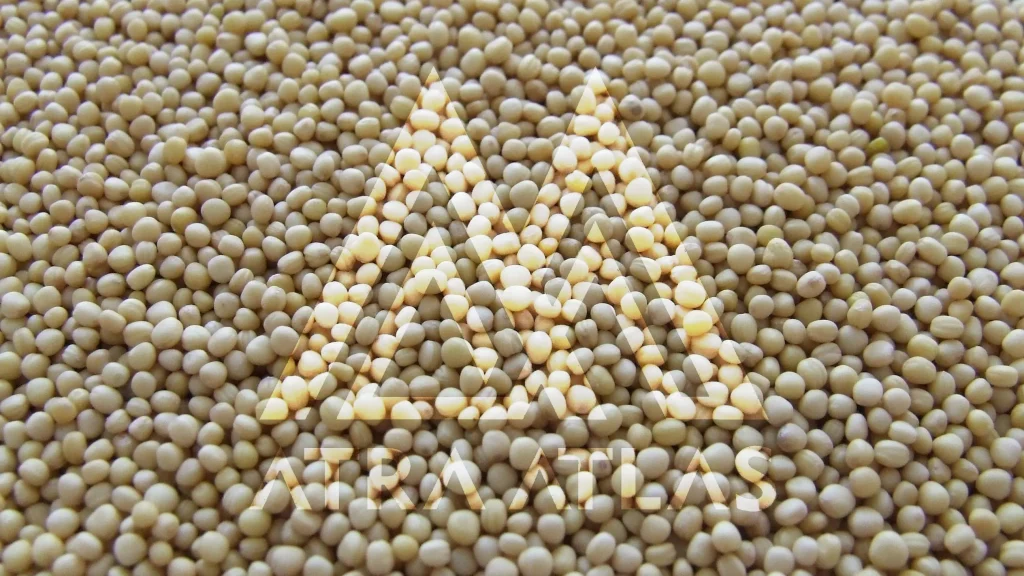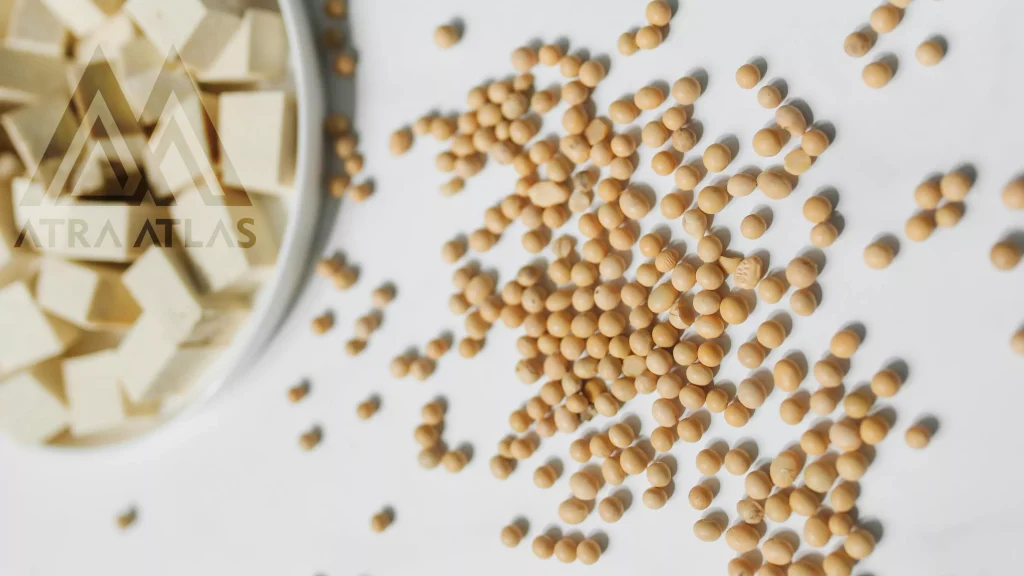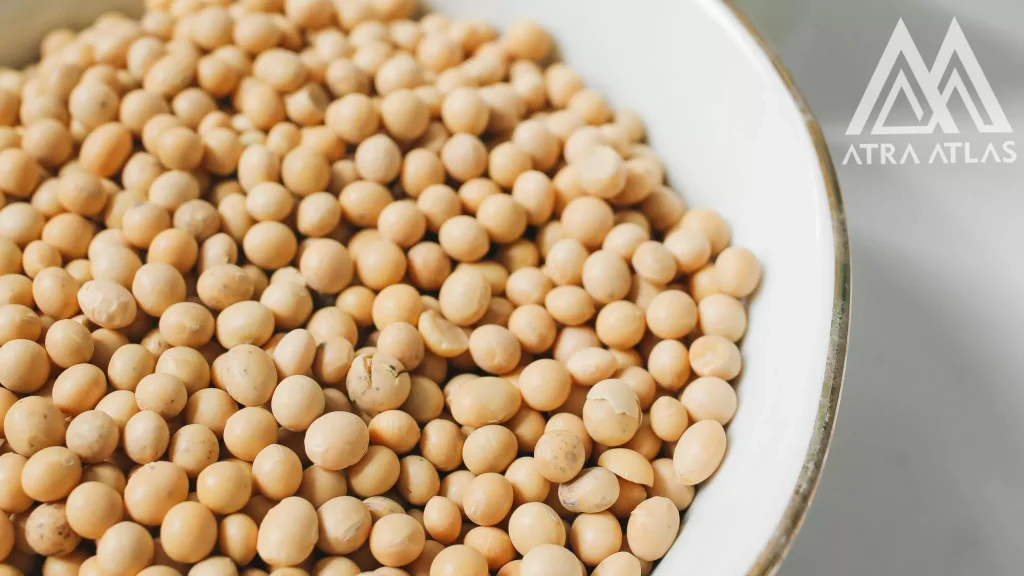
soy
Brazilian soybean exports and soybean meal imports are two important sources in livestock and poultry feed. The nutritious soybean grains are in high demand for enriching livestock and poultry feed in the country, hence in many areas, soybean production is insufficient to meet the market demand, and officials and companies have to compensate for this shortage through soybean imports.
According to news sources, more than 84,000 hectares of land under soybean cultivation produce the finest nutritious grains from this group of agricultural products. The provinces of Fars, Esfahan, Gilan, North Khorasan, Tehran, Zanjan, Qazvin, Khuzestan, and several other areas possess the largest soybean cultivation lands.
Soybean and soybean meal imports become more important when the bulk sale of soybeans in the domestic market faces disruptions or when exchange rates for exports and imports decrease.
Soybean cultivation in Iran needs to be developed. Until the groundwork for scientific, principled, and optimized cultivation is provided, market shortages must be compensated through soybean imports.
Various factors are involved in the wholesale buying and selling of soybeans as a nutritious grain. These price changes are related to fluctuations in supply and demand in the market. It is worth mentioning that the price of seeds for planting soybeans and harvesting quality products indirectly affects the final price of this agricultural product.
The livestock and poultry breeding industries are highly dependent on soybean and soybean meal imports. Soybeans are used to prepare animal feed. Therefore, if the market volume is saturated, it benefits farmers; this means positive profitability for those engaged in soybean cultivation and production.
What is the difference between soybean meal and soy?
Soybean is an oilseed with high nutritional value. What we know as the soybean product is the harvested soybean grain from agricultural land, used for livestock and poultry feed or enriching protein substances. When soybean grains are compressed and their water and oil are extracted, what remains is called soybean meal.
Soybean meal is not used for human consumption but is an excellent ingredient for livestock, poultry, fish, and other animals’ feed. These high-nutritional-value compounds play a crucial role in livestock nutrition and the production of protein products.
Given the definition of soybean and soybean meal, the importance of soybean imports and soybean meal imports becomes clear. These imports significantly help meet the needs of livestock and poultry industries, leading to profitability and improving the quality of feed for livestock and poultry.
A significant volume of this important product is imported to enrich livestock and poultry feed in terms of protein percentage. By adding soybean meal to livestock and poultry feed, the protein content can be increased up to 49%. This means that animals receive the nutrients they need to grow better.
For several decades, soybean meal has attracted the highest demand in the livestock and poultry industry due to its unique role in providing a source of easily digestible amino acids for animals (sheep, chicken, aquaculture, dairy cows).
Today, soybean meal is listed among the best options for poultry feed to receive high-quality proteins. The rapid increase in demand for soybean meal was accompanied by the Asian economic miracle of the 1980s, and it may one day experience a similar high growth rate in Africa and India.

The main reason for using soy
Rich Protein Source: Soybean is one of the best sources of high-quality protein that contains all the essential amino acids required by livestock and poultry. This protein aids in the growth and strengthening of animal muscles.
High Digestibility: Soy protein is easily digested by the digestive system of livestock and poultry, which ensures that nutrients are absorbed in the best possible way.
High Nutritional Value: In addition to protein, soybeans contain important vitamins and minerals such as phosphorus, potassium, B vitamins, and vitamin E, which contribute to the overall health of livestock and poultry.
Weight Gain and Productivity: Using soy in the diet of livestock and poultry leads to body weight gain and improved feed efficiency, ultimately resulting in increased production of meat, eggs, and other animal products.
Cost-Effectiveness: Soybean is considered a cost-effective nutritional source for livestock and poultry due to its abundant production and reasonable price.
Processing Versatility: Soybean can be processed into various forms such as soybean grains, soybean meal, and other by-products, each of which can be used in different ways in livestock and poultry diets.
Soybean Distribution Center in Brazil: The Main Source of Soybean Supply for Global Markets
Consumption of various types of soybeans and soybean meal plays an unparalleled role alongside the development of agriculture in Brazil. Brazil, the fifth largest country in terms of area and population and the largest in terms of arable land, is one of the few countries with the potential to increase agricultural productivity due to its favorable climate conditions.
Brazil feeds about 10% of the world’s population. Over the past two decades, Brazil has established itself as a major producer of agricultural commodities and related food products, as well as a supplier to international markets. It is now one of the top 5 producers and the largest net exporter in the world.
Factors that have transformed Brazil mainly include the development of agricultural research, which has led to increased yields, expansion of farmland, large investments in production technologies to develop crop and forage varieties, and increased global demand for food and animal feed, especially in the past decade.
Brazil, with its high production and export of soybeans, plays an important role in meeting the world’s nutritional needs. Agricultural research and the development of new technologies have enabled Brazilian farmers to produce higher quality products. Large investments in new technologies have increased productivity and quality of products, making the country one of the leaders in the agricultural industry.
The increasing global demand for soybeans and soybean meal is also due to population growth and the increasing need for protein products. With its vast arable land and abundant natural resources, Brazil has been able to effectively meet this demand and play an important role in international markets.
This country, by implementing numerous research and development projects, has helped improve agricultural processes and increase the production of high-quality products. Agricultural development in Brazil has not only strengthened the country’s economy but also improved global food security.
Most importantly, Brazil’s ability to harvest two to three crops per year on a single plot of land makes it unique compared to other grain and soybean-producing countries. Factors such as export-oriented macroeconomic policies, long periods of currency devaluation, specific soybean crop agricultural policy incentives, improved health controls, attracting foreign competitors, and the growing presence of multinational companies and foreign investment have all contributed to this success.
In the last seven years, the continuity and expansion of trade in basic commodities and the diversification of markets and products have been at the core of Brazil’s agricultural growth strategy. Since the mid-2000s, Brazil has accelerated its transformation from a primarily tropical agricultural exporter of products such as coffee, sugar, citrus, and cocoa to a major global supplier of commodities including soybeans, grains, cotton, ethanol, and meat.
Brazil, with its high production and export of soybeans, plays an important role in meeting the world’s nutritional needs. Agricultural research and the development of new technologies have enabled Brazilian farmers to produce higher quality products. Large investments in new technologies have increased productivity and quality of products, making the country one of the leaders in the agricultural industry.
The increasing global demand for soybeans and soybean meal is also due to population growth and the increasing need for protein products. With its vast arable land and abundant natural resources, Brazil has been able to effectively meet this demand and play an important role in international markets.
This country, by implementing numerous research and development projects, has helped improve agricultural processes and increase the production of high-quality products. Agricultural development in Brazil has not only strengthened the country’s economy but also improved global food security.
Soybeans are vital in the expansion of Brazil’s agricultural sector and its rise as a global supplier of agricultural products. In 2000, Brazil’s soybean exports were 40% of U.S. exports. Now they have surpassed U.S. exports by 20%.
Brazil supplies more than 50% of the world’s soybean trade from products grown on 17% of the country’s arable land. The value of Brazil’s agricultural exports, including processed products, has grown an average of 9.4% per year from 2000 to 2021, accounting for 37% of Brazil’s total exports.
Brazil currently exports major agricultural commodities and food products to 222 countries and regions and is the third-largest agricultural exporter in the world after the European Union (EU) and the United States. The value of Brazil’s agricultural exports reached $125 billion in 2021, led by soybeans and soybean meal, sugar, beef, poultry, corn, cotton, coffee, and citrus fruits.
According to the FAO, Brazil uses 63.5 million hectares for crop production out of more than 410 million hectares of total arable land, indicating that further agricultural growth is possible.
In 2022, fertilizer consumption in Brazil accounted for 17.3% of total global fertilizer consumption. Brazil is the fourth-largest fertilizer importer in the world after China, India, and the United States.
Brazil, with its high production and export of soybeans, plays an important role in meeting the world’s nutritional needs. Agricultural research and the development of new technologies have enabled Brazilian farmers to produce higher quality products. Large investments in new technologies have increased productivity and quality of products, making the country one of the leaders in the agricultural industry.
The increasing global demand for soybeans and soybean meal is also due to population growth and the increasing need for protein products. With its vast arable land and abundant natural resources, Brazil has been able to effectively meet this demand and play an important role in international markets.
This country, by implementing numerous research and development projects, has helped improve agricultural processes and increase the production of high-quality products. Agricultural development in Brazil has not only strengthened the country’s economy but also improved global food security.
Fertilizer use and impact on Brazilian agriculture
More than 70% of fertilizer in Brazil is allocated to three main crops: soybeans (44%), corn (17%), and sugarcane (11%). Fertilizer costs account for 25% of the operational costs for soybeans in the traditional southern agricultural region, 21% for wheat and corn in the western frontier region, and 12% for sugarcane in both regions.
Since approximately 85% of the fertilizer used in Brazil is imported, changes in oil prices directly affect the price that farmers pay for fertilizer.
Impacts and Challenges of Fertilizer Imports and Soybean Trade in Brazil
Considering that Russia and Belarus together supply nearly 40% of Brazil’s fertilizer needs, it is expected that price increases will reduce the amount of agricultural fertilizer used by Brazilian farmers.
China is the world’s largest importer of soybeans. The United States and Brazil are the two largest soybean producers, and both countries depend on China for most of their exports.
Brazil’s soybean production and exports have accelerated since the country’s trade liberalization in the mid-1990s. During the US-China trade war and China’s retaliatory tariffs on US soybeans, Brazil was able to gain more competitive power in the export market compared to the United States.
Brazil is China’s most important trade partner in South America.

Importing Brazilian livestock soybeans and their derivatives to Iran
Soybeans and various other derivatives, including soybean meal and crude oil, are imported to Iran from countries such as Brazil, Argentina, and the United States. Brazilian soybeans are one of the most important sources of plant-based protein that no other product can replace. The reasonable price and high protein content of soybeans highlight their primary role in the diet of livestock and poultry.
Today, this valuable protein grain is found in Asian countries, and the origin of soybeans can be traced back to Asian countries like India and China.
Nutritional value of Brazilian soybeans in the animal feed industry
Soybeans are recognized as a complete protein source. The purchase of guaranteed and high-quality soybeans is in favorable conditions. Soybeans are offered as a high-quality and premium product in the market and are among the valuable agricultural products globally. Due to their high protein content and valuable minerals, soybeans are used in various industries and sectors.
Brazilian soybeans are a price point that every livestock farm, poultry farm, and economic complex related to livestock and poultry should be aware of.
Licenses and conditions required to buy soybeans from the port
Post-Clearance Service System
Operating License
Warehouse Community Registration System
How to buy and sell Brazilian soybeans
Atra Atlas Trading Company specializes in the export of various types of soybeans from Brazil. With experience and expertise in international trade, this company exports the highest quality soybeans from Brazil and offers them to foreign markets.
Those who intend to export this product can contact Atra Atlas Trading Company through its communication platforms. Atra Atlas Trading Company provides professional services and complete support, making the export process simple and reliable for its clients.
